How Many Guests Should I Invite to My Wedding?

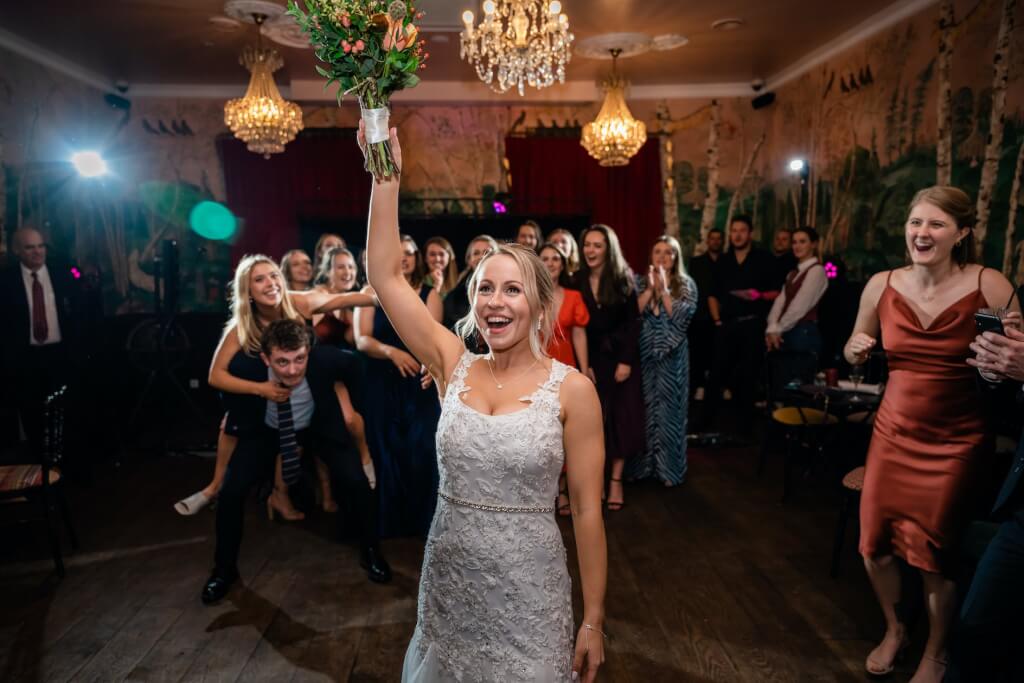
The size of your guest list will dictate every part of your big day, from the venue and vendors, to even the overall atmosphere. Plus, the more guests you invite, the bigger your budget needs to be. As a result, it’s natural to question how many people you genuinely need at your wedding.
While it’s understandable to want to share your special day with as many loved ones as possible, it’s essential to weigh the costs associated with accommodating a larger guest list against your overall wedding vision. Take the time to prioritise your must-have guests and consider alternative ways to celebrate with those who may not be able to attend the main event.
If you’re struggling with how many people you should invite, keep reading! This helpful guide will highlight what’s considered to be a small, medium, or big wedding, as well as typical headcounts for a variety of ceremonies.
What is a wedding guest list?
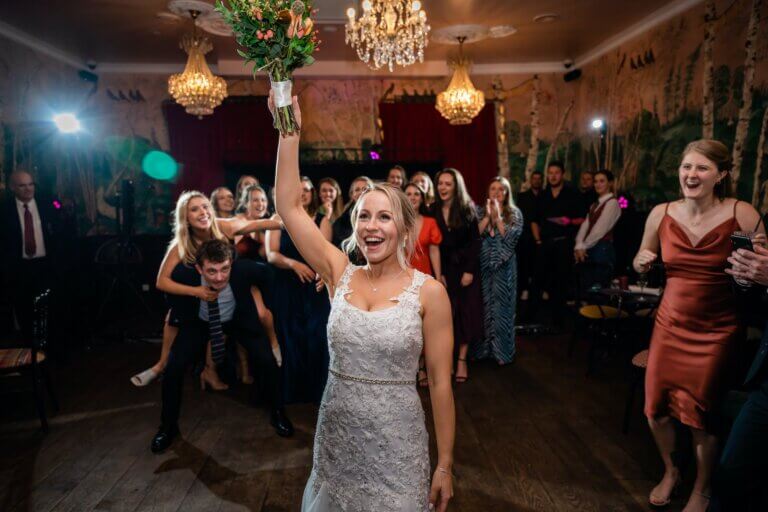
A wedding guest list is a list of all the people you plan to invite to your wedding. It isn’t necessarily a list of all the people who will come to your wedding. That will depend on whether they RSVP. Some couples plan for this and over-invite by around 10-15%. However, this runs the risk of everyone wanting to come, and your big day ends up bigger than you’d ever imagined!
Planning your wedding guest list is likely to go through several phases. This includes drafting, cutting, re-drafting, and re-cutting. If you’re struggling with getting started, check out our post on how to write a wedding guest list, including some handy tips on who needs to be there and who you can leave off!
How many guests should I invite for a small wedding?
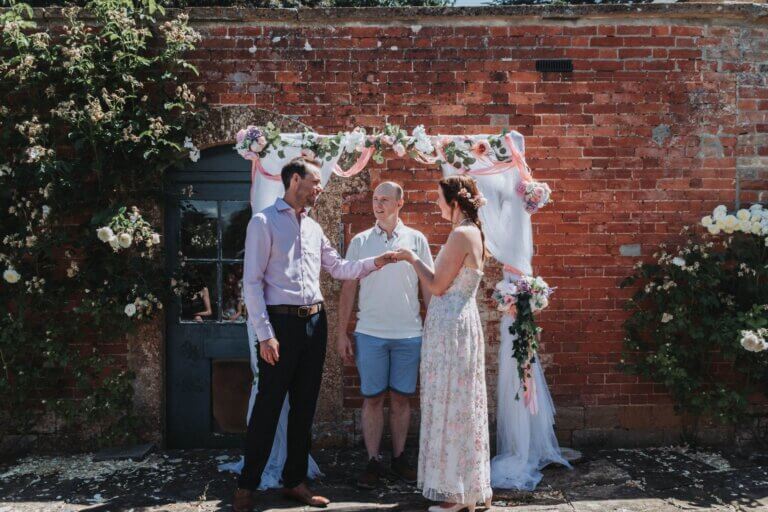
There’s no hard definition of what constitutes a small wedding. But, generally speaking, a small wedding is one where the guest list is fewer than 50 people.
If you’re thinking about having a small wedding, there are several benefits:
- It’s more intimate. You’ll actually be able to spend 1-on-1 time with everyone you’ve invited, making your special day even more meaningful and memorable. An intimate celebration can also be a lot less pressure than a large extravaganza.
- It’s more cost-effective. A smaller guest list means you can book a smaller venue, pay less for catering, and purchase fewer invitations. This means you can spend more money on the things that really matter to you, like flowers, the cake, your dress, or a higher-quality suit. In fact, couples who host 50 guests or less spend 42% less on their weddings than the national UK average.
- It’s less formal. Small weddings tend to be less formal and more relaxed than larger weddings. Couples may opt for casual attire, simplified ceremony formats, and informal dining arrangements to better reflect their personal style and preferences.
On the other hand, there are some drawbacks:
- Tough decisions. Unless you’re from a small family, you might have to make some pretty difficult decisions to get your guest list below 50. This might include not inviting friends, colleagues, or even some extended family members. Be sure to communicate this tactfully with your partner to prevent guest list arguments.
- Vendor limits. Some vendors and wedding venues have a minimum headcount, and having a smaller wedding may not reach these limits. Be sure to check whether your dream venue has minimum guest requirements before finalising your guest list with them!
How many guests should I invite for a mid-size wedding?
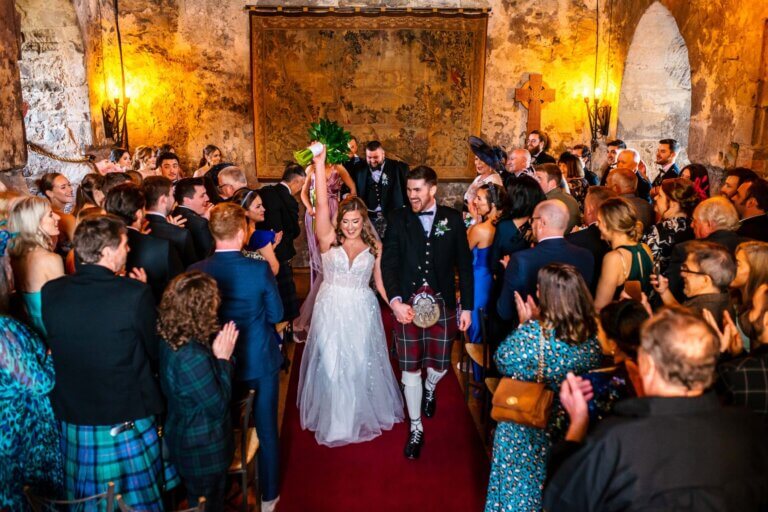
A medium-sized wedding is generally considered to be between 50 and 100 guests. It’s the size that many couples opt for, as you get the best of both.
The benefits of a medium-sized wedding include:
- Balanced atmosphere. A medium-sized wedding offers a balance between intimacy and energy. With a moderate number of guests, there’s still a sense of closeness and connection while also providing enough people to create a lively and celebratory atmosphere.
- Diverse guest list. A bigger guest list means more space to invite friends, extended family, and neighbours or colleagues. This allows for a mix of social circles and relationships, fostering a sense of community and inclusivity.
- Better vibes. More people means more party. Guests will bounce off one another’s energy for a vibrant celebration.
Naturally, there are some disadvantages, too:
- Guest list management. Increasing your guest list also means you need to consider complex family dynamics and navigate friendship fall-outs. This can prove challenging when it comes to seating arrangements.
- Higher cost considerations. More guests will mean increased catering, venue, and wedding invitation costs. Be sure to budget accordingly for a larger guest list!
How many guests should I invite for a large wedding?
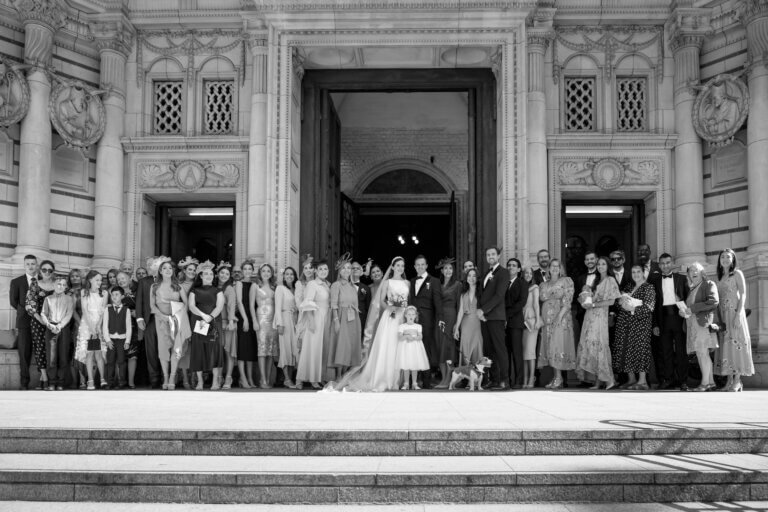
A big wedding is considered to be anything over 100 guests. Large weddings give you the opportunity to invite everyone you love to celebrate your fairy tale day.
The benefits of a big wedding include:
- A great atmosphere. Most people are in a great mood at a wedding, and that energy will spur you on through your big day. The vibe at a big wedding is like nothing else, and is guaranteed to make for the party of a lifetime!
- A chance to meet one another. A big wedding is the perfect opportunity for families and friends to come together and celebrate love. They’re all one big family now, after all, so it’s time they got to know each other.
- A memorable experience. A big wedding will leave an especially lasting impression on both you and your guests. The scale and grandeur of the event are sure to become talking-points, and create unforgettable memories.
Aside from the increased cost of a large wedding, drawbacks include:
- Attention spread more thinly. With more guests to greet and interact with, you may find it challenging to spend quality time with each individual guest. This can result in guests feeling less personally connected to the day.
- Noise and crowd control. While more guests contribute to a lively atmosphere, they can also lead to increased noise levels and potential overcrowding, especially in smaller venues. You may need to implement strategies to manage noise levels and ensure the comfort of all your guests.
How does the headcount affect the cost of a wedding?
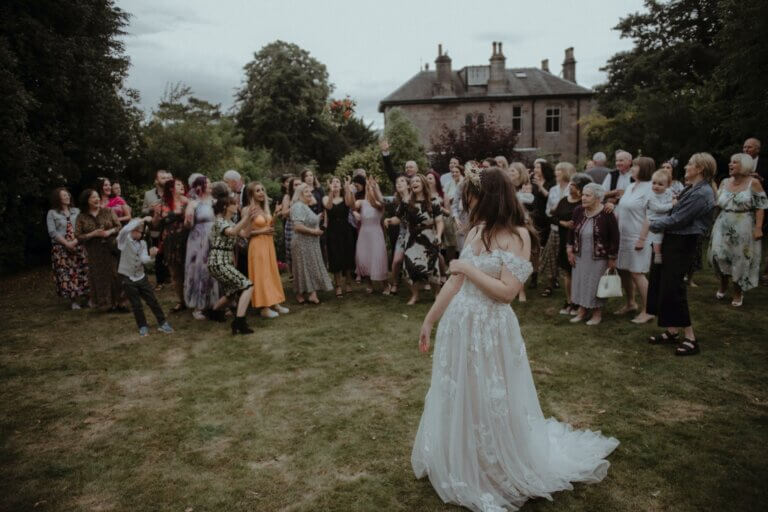
We’ve already touched on this above, but the number of guests you invite can significantly influence wedding spending. The more guests you invite, the more your wedding will cost. This rise is mainly due to catering costs. More guests naturally means more mouths to feed. Here are the average costs you can expect to pay depending on the size of your wedding. For more information on average UK wedding costs in general, check our our dedicated article.
- 50 or fewer guests – £12,006
- 51-100 guests – £20,340
- 101-150 guests – £25,175
- 151 or more guests – £37,431
How many guests are typical for…
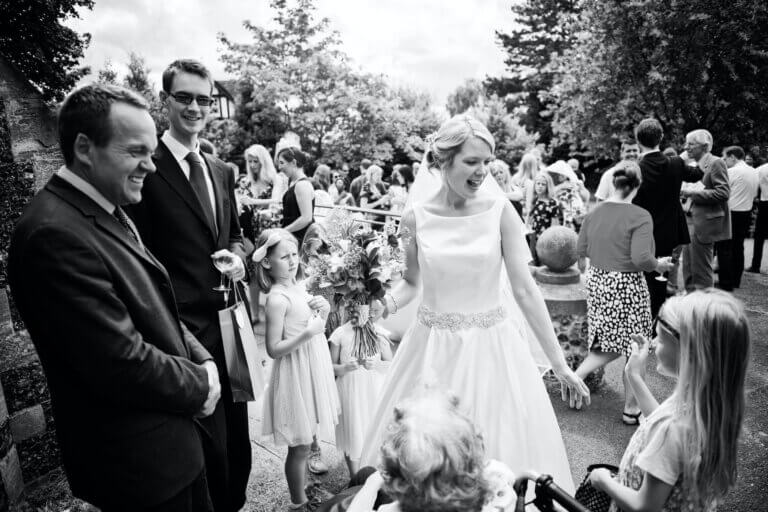
An elopement
Couples don’t typically invite guests to an elopement.
In fact, the point of an elopement is to be spontaneous, romantic, and private, so guests aren’t usually necessary or even desired. However, you may wish to invite one or two guests to act as witnesses or share in the celebration afterward.
Some couples also like to organise a party after they return from their elopement. This party is the opportunity to celebrate your marriage with family and friends who couldn’t come to the elopement itself. You can invite as many people as you’d like to this party.
A registry office wedding
For a registry office wedding to be legally-binding, you need to have at least two people present to act as your witnesses. They can be friends, family, or anyone with a significant role in your life. They must also be over 16 and understand English to qualify as witnesses.
A Church/religious wedding
The size of a church wedding will be dictated by the size of the church, at least for the ceremony itself. Larger churches may accommodate hundreds of guests, while smaller churches may have more limited seating available.
Indian wedding
Indian weddings tend to be large, elaborate affairs that involve extensive guest lists and multiple days of celebrations. It’s not uncommon for Indian weddings to have hundreds or even thousands of guests in attendance.
Family and community are central to Indian culture, so weddings often serve as opportunities to bring together relatives, friends, and acquaintances from near and far to celebrate the happy couple.
Destination wedding
Destination weddings tend to have fewer guests due to the increased cost of flying abroad. This smaller guest count allows for a more relaxed and personal atmosphere, where couples can spend quality time with each guest and create unforgettable memories in a beautiful and exotic setting.
The bottom line on wedding guest count
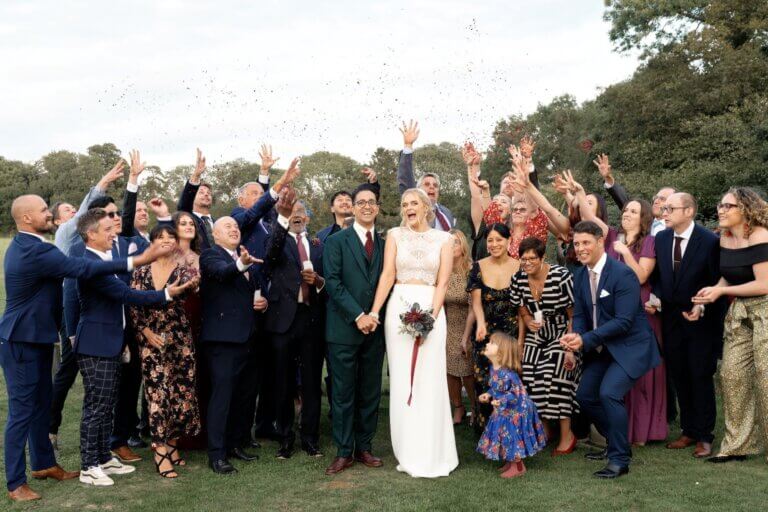
There’s really no perfect wedding size. The most important thing is that the people who truly matter to you are there and that your guest list fits within your budget. So, whether you’re planning a larger-than-life Indian wedding, a low-key intimate gathering, or a romantic elopement, focus on surrounding yourself with the love and support of those who mean the most to you.
If you’re struggling to visualise your guest list and aren’t sure where to begin, or have already sent out your invites but aren’t sure how to manage it all, try Bridebook’s free Guest List tool. Sign up today to make your wedding guest management a breeze and plan the celebration of your dreams!
Frequently Asked Questions

How many people are usually invited to a wedding?
The typical wedding has between 50 and 100 guests. However, this depends on the size of your venue, your budget, and the type of wedding you’re throwing. For example, the average Indian wedding will have a lot more guests than the average registry office ceremony.
What is a good number of guests for a wedding?
A good number is whatever number suits your budget and priorities. Try to avoid the temptation to inflate your guest list for the sake of meeting an arbitrary number. As long as your list has everyone you love on it and fits in your budget, it’s a good number.
Is a 100 person wedding small?
A wedding of over 100 people is typically considered to be a big wedding rather than a small one. However, it may be considered small in certain cultures where weddings are more of a social event, for example, Indian weddings.
You Might Also Like…
- Introduction: Your Wedding Guest List
- 11 Wedding Guest List Arguments All Couples Have (And How To Resolve Them)
- How To: Discuss Your Wedding Guest List With Your Family
- Wedding Etiquette: Who (Traditionally) Pays For What?


